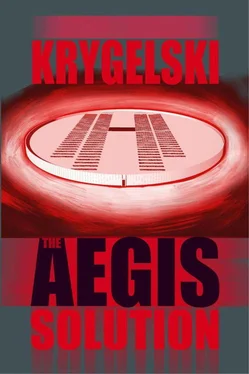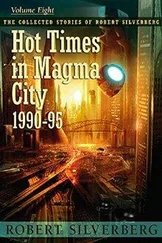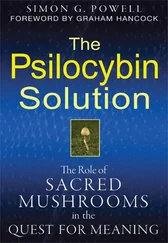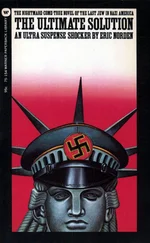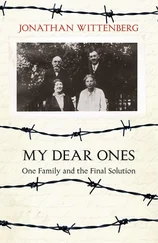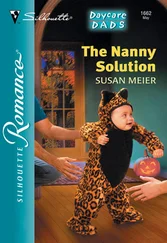“Right. And the bottom line was that, after twenty hours of hell, approximately sixty percent of the population was dead, more than three thousand people.”
Pierce paused and Elias said nothing. The silence hung heavily in the room.
Shifting his gaze down to the desk, his voice a flat monotone, Pierce continued, “Cleanup parties were organized. The wounded were treated as best we could. The dead were gathered up, using those gray plastic rolling bins that construction crews use to haul material, and taken to the trash compactor.”
Pierce hesitated for a moment, looking up at Elias, and said, “You know what was the most surreal aspect of the cleanup?”
Elias did not answer, waiting.
“The crews, who self-organized to do the work, contained members from both sides of the conflict, working side by side. No one mentioned anything. I’m certain it was because no one wanted to trigger another flare-up. But watching it…participating in it…knowing the folks right next to me had committed horrendous deeds…was almost more than I could bear.”
“I can’t even imagine what that was like,” Elias responded quietly.
“After the cleanup…after all the bodies were gone and the damage was repaired, discussions to segregate just happened. There was no doubt that it was necessary or appropriate. Madison was created, as were Walden and ZooCity.
“And to address your initial question, I guess I was selected to run Madison for the same reason Mildred was chosen for Walden. Neither of us had participated in the rampage.”
“I’m sure there’s more to the choice than simply that.”
Pierce shrugged. “Perhaps. On the outside I had been a politician, a mayor. Mildred had been a city manager. We both had training and experience overseeing a populated entity. But I am certain that the first criterion was primary in most people’s minds as they voted.”
“So each enclave was set up with its own set of rules?”
Pierce nodded. “Its own set of rules. Its own bylaws. In reality, its own personality.”
“I’m guessing Madison was modeled after the Constitution.”
“The Constitution,” Pierce acknowledged, “as well as some of the papers of our Founding Fathers and, of course, the Bible.”
“And Walden?” Elias asked.
A sudden snort came out of Pierce. “I’m not sure exactly what Walden was based upon. My sister and I were always at the opposite ends of the political spectrum. From the time we were young teens, she was always ‘out there.’ I suppose you could say she’s a utopian.”
“Really?” Elias reacted with a note of surprise in his voice. He had already formed his own opinions about Walden but had decided to play along.
“I don’t know how else to capture it in a single label. During our youth, we debated constantly. I had, very early on, become entranced with the beauty of not only the logic of our founding documents, but the wisdom. And by that, I mean the grasp that Jefferson, Madison, Hamilton, and the others had on the realities of human nature. They wanted to create a system where the individual could flourish, but at the same time recognized our frailties and faults, and knew that safeguards — checks and balances — needed to be in place, if the nation was to survive.
“My sister resented the checks, the limits, placed upon the individual and believed that people, given the chance, would self-regulate; that morals and ethics would somehow spontaneously spring into the very fabric of the social consciousness; that they would come from within each person; that there was no need for having them imposed from without; and that, in fact, imposing them created, by the very act of imposition, a de facto oppression that withered the soul of the individual.”
“Nice thought.”
“Exactly!” Pierce almost shouted. “That was what I said to her time and time again. I always told her that what she described would be wonderful, would be a society which was idyllic, except for one problem….”
“People.”
“Right. Maybe, at some point in the distant future, people will be able to handle that kind of structure, but we aren’t there yet.”
“Didn’t she see that obstacle with her own eyes at the time the massacre erupted in Aegis?”
Pierce became subdued. “I would have thought so. But she didn’t. She rationalized it. She was absolutely certain that the outbreak was caused by intolerance. If only Beth Havlichek had looked the other way as she encountered the couple having sex in the corridor, if only she had accepted that sex is a natural act, not something to be disgusted by, and not judged the couple, the fuse on the powder keg wouldn’t have been lit.”
Elias shook his head. “So the problem your sister had with the first incident wasn’t that the couple killed Havlichek; it was that she made a disapproving comment?”
“Right, if you can believe it.”
“The brief period of time I spent in Walden, I didn’t see anyone in flagrante delicto in the hallways.”
With a sound that could only be described as “harrumph,” Pierce confided, “You were lucky. I’ve visited Walden on more than one occasion since the segregation occurred, and I’ve seen more than I cared to see.”
“What about ZooCity? Do they have a defining set of principles?”
“You could say that,” he answered sarcastically, “if you are inclined to define the absence of such as a defining set.”
“Isn’t that what Walden is all about, though?”
Once again leaning back in his chair, this time causing a loud creak, Pierce elaborated, “You have made the same point I’ve tried to convey countless times to my sister. There is a distinction between the two, but it is, in my opinion, a subtle one. I think that ZooCity is a logical extension of the Walden philosophy — the same concepts and ideals, only taken to an extreme. ZooCity types definitely do not want to be encumbered with rules, limitation, a rigid set of ethics; in that, they are similar to the Waldens. The difference lies in what they are willing and capable of doing to outsiders and even to each other. Even murder is as casual an act to them as swatting a fly would be to you and me.”
“I witnessed that during my encounter with them.”
“Is that so? What happened?”
“When I was first confronted by the group, I grabbed one of the members as a hostage, hoping they would back off and let me pass. Their response was to simply shoot him. They killed their own man.”
Disdain etched itself across Pierce’s face at Elias’ description of events. “Precisely. That is quite typical of their actions, from what I’ve heard.”
Elias decided to steer the conversation back to the topic he cared most about. “If I may ask an unrelated question?”
“Of course. What is it?”
“Have you, or your people, come across a man by the name of Stone, Eric Stone?”
“Stone?” Pierce turned to a large, old-fashioned Rolodex on his desk and spun the wheel around until he located the “S” tab. “Don’t recall that name. When would he have arrived?”
“Several weeks ago.”
Searching the correct section, Pierce thumbed through several of the cards. “I have a few citizens with the name Stone, but no Eric. Nor do I recall a gentleman by that name passing through. Friend of yours?”
Elias kept his tone casual. “More of an acquaintance, actually. He had told me he was checking in at Aegis a while back. To be honest, Eric doing it first sort of helped me to decide. And I don’t really know anyone else in here.”
Flipping closed the lid of the Rolodex, Pierce returned his attention to Elias. “Anything else you wanted to ask?”
For a moment, Elias almost asked about Kreitzmann but thought better of it. Inquiring about one person would probably appear normal; two might give Pierce pause. “No. That was it.”
Читать дальше
